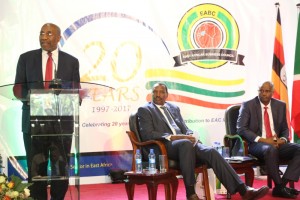Regional businesses want bigger share

Dr. Rugunda addresses guests at the EABC celebrations while Kabeho and Mfumukeko look on in Nairobi last week.
March 26, 2018—- Jim Kabeho, the East African Business Council (EABC) Chairman highlighted the importance of local content especially in the huge infrastructure projects being undertaken by governments across the region and dominated by Chinese contractors.
“The local business sector should be allowed to participate in major projects including at the inception. All materials for these projects like cement and steel should be sourced locally rather than abroad.”
According to McKinsey, the international consultancy, there are about 10,000 Chinese firms operating in Africa which is four times the previous estimate and many source inputs, including labour on occasion, from China.
Kabeho said, “China currently dominates the supply of construction materials. Sourcing materials locally will lead to expanded sales as well as capacity building for local businesses,” Kibeho during events to mark the 20th anniversary of the EABC in Nairobi last week.
On the other hand the issue of non-tariff barriers (NTBs) was taken up by Kenya’s Secretary for Cooperatives, Trade and Industry, Adan Mohammed, who represented President Uhuru Kenyatta, said the private sector in East Africa had also contributed to the challenges to intra-regional trade including non-tariff barriers to trade.
He said the private sector had brought about NTBs by pushing their respective home governments to push for national interests as opposed to the regional integration agenda for the sake of preserving their markets. He described the EAC as the most integrated regional economic bloc in terms of trade and infrastructure development, adding that the Community needs to stick together when negotiating trade agreements with other regional economic communities because there is strength in numbers.
Uganda’s Prime Minister, Dr. Ruhakana Rugunda said intra-African trade remains low and currently accounts for only 10% of all commerce on the continent. He called for concerted efforts between African governments and the private sector to enable the continent attain its development objectives.
Dr. Rugunda, who represented President Yoweri Museveni, said doing business as blocs was increasingly becoming the norm as evidenced by the signing earlier this week in Kigali, Rwanda of the Continental Free Trade Agreement (CFTA) by the leaders of 44 African countries.
Dr. Rugunda said that the CFTA, which will come into force within six months, would increase prosperity for 1.2 billion Africans. He congratulated the EABC for striving to see to it that regional integration process is achieved with meaning and tangible results for the citizens of the EAC.
“Since the inception of the EABC, there has been progress towards achieving the integration process through trade and policy reviews, tax harmonization, discussions on the Northern Corridor, stakeholder engagements to improve the free movement of goods and services within the region,” Dr. Rugunda said.
However the Ugandan premier said the region still faces many challenges along the route to full integration including the need for full harmonization of policies and laws. “This is a process that is taking time for all Partner States but a lot of progress has been made in this direction. We have to keep the momentum,” he said.
Peter Munya, Kenya’s Secretary for the EAC and Northern Corridor Development, said the region faced a challenge in the implementation of agreed protocols. “National laws need to be aligned to regional protocols. Partner States also need to push for law reforms back home. The other alternative is to pass overarching laws at the regional level to replace existing legislation. This has been done with success in the European Union,” he said.
Munya called for a review of the Common External Tariff and efforts to make the EAC Single Customs Territory work better, adding that the Community may need to establish a regional institution to make this possible.
He said that the region was currently a net importer of various commodities and advised that governments should prioritise industrialisation. He said that Kenya had prioritised industrialisation under its ‘Big Four Agenda’ and particularly singled out the manufacture of apparel and local motor vehicle assembly.
EAC Secretary General Amb. Liberat Mfumukeko said the Secretariat and EABC had worked closely over the years with both institutions benefiting from the synergies. He said through this partnership, the EAC and EABC had contributed towards the conclusion of several regional legal instruments such as the Customs Union, Common Market and Monetary Union Protocols, One Stop Border Posts Act, the Framework on the elimination of non-tariff barriers to trade, and development of trade standards.

 African Heads of state head to South Korea next week for Summit talks
African Heads of state head to South Korea next week for Summit talks
 Trading leads as main source of income for Ugandans
Trading leads as main source of income for Ugandans
 New leadership for bankers’ umbrella as total assets top $12 billion
New leadership for bankers’ umbrella as total assets top $12 billion
 Brussels Airlines to announce Nairobi service
Brussels Airlines to announce Nairobi service
 SITA promises enhanced travel experience after Materna acquisition
SITA promises enhanced travel experience after Materna acquisition
 Saudia’s 105 aircraft order stretches A320neo lead over rival Max
Saudia’s 105 aircraft order stretches A320neo lead over rival Max
